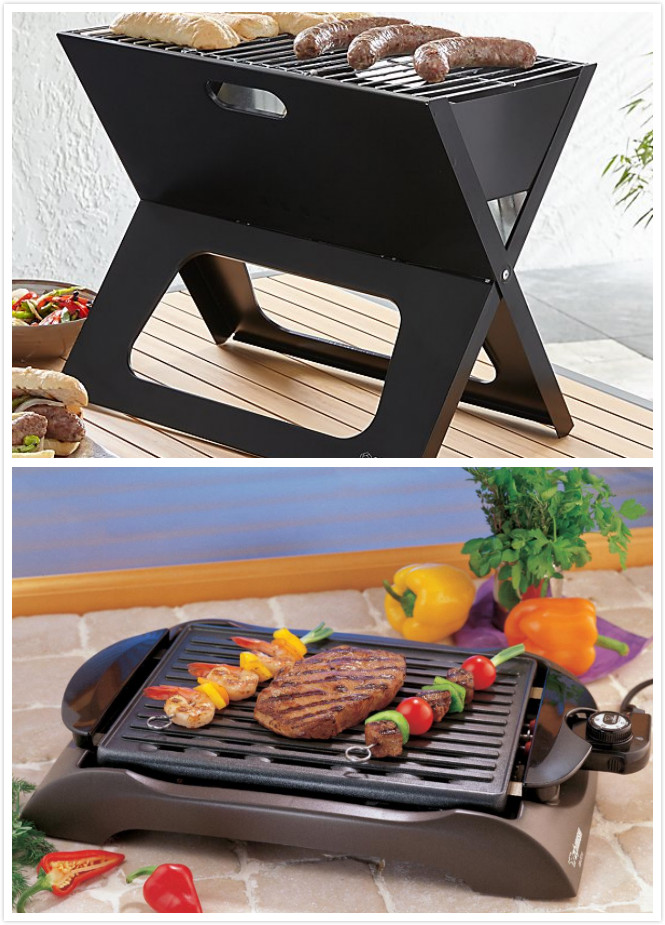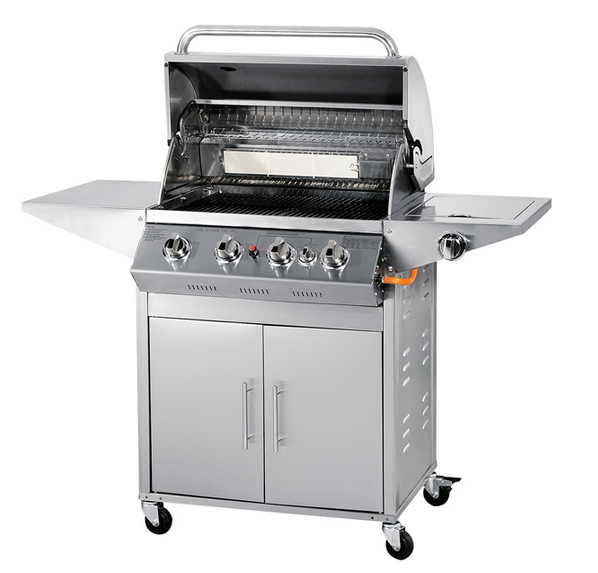
How to Choose a Grill
Propane or Natural gas grill
Require fuel(Propane or Natural gas grill)
Portable, freestanding or built-in designs
Easy to use
A convenient, popular choice, gas grills heat up quickly with a little fuel and the turn of a knob. Most foods cook easily on a gas grill, including chicken, burgers, seafood, bone-out proteins, vegetables, and fruit. Gas grills generally offer more precise temperature control than classic charcoal grills and come in both large capacity and portable designs so you can easily find a size that's right for you.
Tip: Natural gas grills run off of natural gas installed in your home, which means they generally aren't portable – but you also won't ever run out of fuel in the middle of a grill session. If you don't have a natural gas line installed already, consider the set-up costs in your area before committing to a natural gas grill.
Charcoal Grills
Require fire starter, charcoal (lump or briquettes)
The classic, smoky flavor
Intermediate skill
Best for intermediate or expert grillers, charcoal grills require a fire starter, patience, precision and, of course, charcoal. As it burns, charcoal gives hardy foods that classic, smoky flavor that grilling is known for, whether you're cooking up burgers, whole fish, steaks, bone-in meats or extremely dense vegetables. Portable options are easy to pack up and take to tailgates and other outdoor events, too.
Tip: Charcoal takes longer to heat up than gas, but it also burns hotter, which is why these grills can perfectly sear savory foods. Temperature control can be tricky, though, which is why many people consider charcoal to be the true test of grill mastery.

Electric Grills
Electric grills tend to be smaller than charcoal and gas grills, and all it takes to get them going is a power outlet. They don't create the same complex flavor profiles as other methods, but electric grills still offer intense heat to properly cook and crisp meats and veggies. The most convenient of all the grill styles, electric grills are always portable. Find a model designed for indoor and outdoor use to safely grill in any weather, all year long.
Grill Safety Tips
Using your grill incorrectly can be dangerous. Every time you heat yours up, you should practice safe grilling habits. Here are some basic grill safety tips to keep in mind:
Clean your grill regularly.
Check for gas leaks before igniting a gas grill.
Keep your grill at least 10 feet away from structures, trees, and overhangs.
Keep a working fire extinguisher in reach at all times.
If you smell gas when cooking on the grill, immediately turn off the tank and burners.
Never leave your grill unattended when lit.
Never overload your grill with food.
Keep children and pets away from the grilling area.
Read the manual that comes with your grill for additional safety precautions.
Once you know the kind of grill you need, compare a few models to make sure you buy the best one for you. Browse and compare a range of gas, charcoal and electric barbecue grills from trusted name brands like Weber and Char-Broil. Chat with us for help finding the right model at the right price, with all the features you need to make delicious grilled meals at home or on the go!
After enjoying the beautiful food and wonderful time with BBQ, pls remember to clean your BBQ, especially the grill grates, here there are some tips,
1)Porcelain grill grates hold heat well and are rust-resistant, but you want to keep them cleaned and cared for. Any chips or scrapes in the porcelain will expose the metal underneath and allow water to seep in, which can create rust. So when cooking with metal tools be careful not to scrape or nick the grates. When cleaning porcelain grill grates, don’t use metal or wire brushes. Use a soft bristle or a nylon grill brush. Burn off any food leftover on the grates. Then let the grates cool and scrub them with the nylon cleaning brush.
2)Cast iron grill grates are very durable, tolerate high temperatures and create an even cooking surface. They are tough and can withstand just about anything except water — iron is prone to rust. When cleaning cast iron grates, burn off any food left over on the grates. Then let the grates cool and scrub them with the nylon cleaning brush. After cleaning the grates, dry and saturate the grates with vegetable oil to prevent rust from forming.
3)Stainless steel grill grates tolerate intense heat and are fairly rust resistant. It typically only takes a quick brush to keep them clean. When cleaning stainless steel grates, many grillers cover the top of the grates with tough aluminum foil and heat the grates on high for 10 to 15 minutes. The aluminum foil will concentrate the heat on the grates to burn off the leftover food. Let the grates cool and scrub them with a nylon cleaning brush.
Knowing how to choose grills are far from enough, it is way more important to cooperate with bbq grill manufacturer for the best price and most favorable quality.

